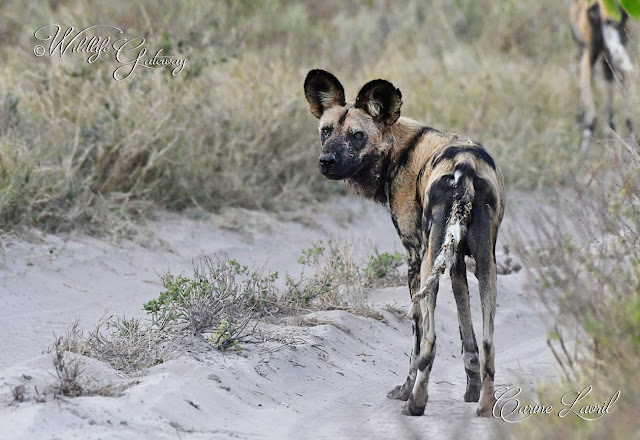 Lycaon pictus
Lycaon pictusJe retrouve enfin cette espèce de canidés sauvages devenue assez rare hélas et confinée à certaines grandes réserves africaines. Cette meute est l'une des deux qui vivent dans le delta de l'Okavango, à Moremi au Botswana.
Le lycaon est le seul canidé à ne posséder que 4 doigts à chaque patte contre 5, et n'a que 40 dents contre 42.
Chaque chien a un pelage qui lui est propre: cette robe "peinte", comme son nom latin pictus l'indique, permet à la meute de savoir qui se trouve où à de grandes distances quand elle chasse. Ses proies sont le plus souvent des antilopes de taille moyenne telles que les impalas.
At last I encontered this wonderful "painted dog", now confined to the remote areas of a few African reserves. This pack is one of the two main ones remaining in the Okavango delta in Botswana.
It the only canidae with only 40 teeth against 42 and 4 toes against 5, in others.





La sieste a lieu normalement près des terriers mais quand la chasse a été infructueuse, les chiens ne rentrent pas et repartent pour une autre tentative afin de rapporter de la nourriture aux chiots.
They usually take their mi-day nap near the dens but if the hunt was unsuccessful, they will remain on the hunting grounds and attempt another prey to bring food back to their young.







Un petit jeu avant de partir en chasse, toujours autour de 17h00 le soir:
Playing before they are off to hunt, always at 17h00 sharp:
Playing before they are off to hunt, always at 17h00 sharp:




Prêts pour le départ:
Ready to go:


Après avoir assurer et ingéré une proie, ils rentrent aussi rapidement que possible avant que la digestion ne commence pour régurgiter la nourriture à leurs jeunes.
After the kill, they ingest as much food as possible and head back to the dens fast before the digestion begins, and regurgitate it to their young.





Sautant par-dessus un ruisseau:
Jumping over the water:



Not the prettiest of the canidae, Noushka, and perhaps not the most endearing with its habits either, but your images capture this species superbly! Take good carem and have a wonderful week - - - Richard
RépondreSupprimerdes animaux magnifiques avec leurs oreilles en cuillère :)) ..et une dentition impressionnante ! photos extra!!! bises
RépondreSupprimerHi Noushka.
RépondreSupprimerBeautiful pictures of these separate animals.
Groettie from Patricia.
Lovely pictures. I was lucky enough to see Wild Dogs in Zimbabwe, but only for a short period as they crossed the track behind our Land Rover. It looks as though you were able to observe this pack for quite a long time.
RépondreSupprimerHi Noushka,
RépondreSupprimerSuper set of images of these colourful Wild Dogs.
All the best John
Dearest Noushka,
RépondreSupprimerWow, you did capture this very rare wild dog in a perfect way.
A funny animal, being 'painted dog' but I do love its shape and body features very much!
What a tough life for surviving and they have to run with their food to the young...
Thanks for sharing this extinct species with us!
Hugs,
Mariette
Thanks for the tip, we were without WiFi connection at all for days and I thought I had checked back on what I might have missed, obviously I did not look well!!! I have to disagree with Richard, I think wild dogs are pretty and I just love them. I just hope that they can keep enough alive to keep breeding them. What with traps and distemper they are having a hard time. Magnificent set of photos and I just love that last one in action. Thanks for thinking of me with this post, much appreciated. Take care, hugs Diane
RépondreSupprimerHi Noushka,
RépondreSupprimer10 Years ago we visited the Africat foundation in Okonjima in Namibia. Among the animals we saw here was also a smal pack of wild dogs. In the wild we were once close but unfortunately we missed them. I like these animals. It is certainly a pity that their number has decreased enormously.You showed a great series of pictures here.
Greetings, Kees